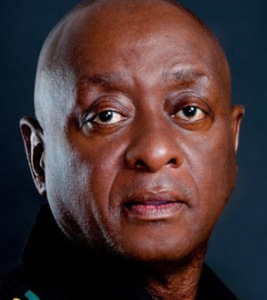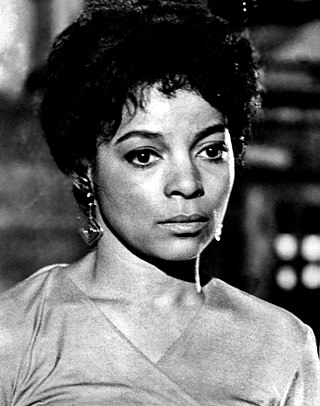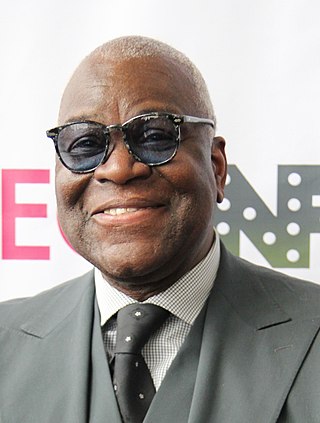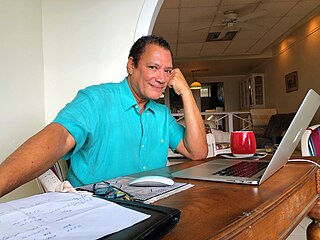Related Research Articles

Raiford Chatman "Ossie" Davis was an American actor, director, writer, and activist. He was married to Ruby Dee, with whom he frequently performed, until his death. He received numerous accolades including an Emmy, a Grammy and a Writers Guild of America Award as well as nominations for four additional Emmy Awards, a Golden Globe Award, and Tony Award. Davis was inducted into the American Theater Hall of Fame in 1994 and received the National Medal of Arts in 1995, Kennedy Center Honors in 2004

Mbongeni Ngema was a South African playwright, lyricist, composer, director, choreographer, and theatre producer, best known for co-writing the 1981 play Woza Albert! and co-writing the 1988 musical Sarafina!. He was known for plays that reflected the spirit of black South Africans under apartheid, and won much praise for his work, but was also the subject of several controversies. He died in a car accident on 27 December 2023.

Ruby Dee was an American actress, poet, playwright, screenwriter, journalist, and civil rights activist. Dee was married to Ossie Davis, with whom she frequently performed until his death in 2005. She received numerous accolades, including a Emmy Award, a Grammy Award, an Obie Award, and a Drama Desk Award, as well as a nomination for an Academy Award. She was honored with the National Medal of Arts in 1995, the Screen Actors Guild Life Achievement Award in 2000, and the Kennedy Center Honors in 2004.

Rosetta LeNoire was an American stage, film, and television actress. She was known to contemporary audiences for her work in television. She had regular roles on such series as Gimme a Break! and Amen, and is particularly known for her role as Estelle "Mother" Winslow on Family Matters. In 1999, she was awarded the National Medal of Arts.

Ntozake Shange was an American playwright and poet. As a Black feminist, she addressed issues relating to race and Black power in much of her work. She is best known for her Obie Award–winning play, for colored girls who have considered suicide / when the rainbow is enuf (1975). She also penned novels including Sassafrass, Cypress & Indigo (1982), Liliane (1994), and Betsey Brown (1985), about an African-American girl run away from home.

George Costello Wolfe is an American playwright and director of theater and film. He won a Tony Award in 1993 for directing Angels in America: Millennium Approaches and another Tony Award in 1996 for his direction of the musical Bring in 'da Noise/Bring in 'da Funk. He served as Artistic Director of The Public Theater from 1993 until 2004.

The American Negro Theatre (ANT) was co-founded on June 5, 1940 by playwright Abram Hill and actor Frederick O'Neal. Determined to build a "people's theatre", they were inspired by the Federal Theatre Project's Negro Unit in Harlem and by W. E. B. Du Bois' "four fundamental principles" of Black drama: that it should be by, about, for, and near African Americans.

The Ensemble Theatre, located in the heart of midtown at 3535 Main Street in Houston, Texas, is the largest African-American professional theatre company in the United States that produces plays in-house and owns its own facility.

for colored girls who have considered suicide / when the rainbow is enuf is a 1976 work by Ntozake Shange. It consists of a series of poetic monologues to be accompanied by dance movements and music, a form which Shange coined the word choreopoem to describe. It tells the stories of seven women who have suffered oppression in a racist and sexist society.

The Lorraine Hansberry Theatre is an African-American arts institution located in downtown San Francisco. It is named after Lorraine Hansberry, who wrote A Raisin in the Sun while living in Bay Area. Since being founded in 1981, The Lorraine Hansberry Theatre has mounted productions that have included performances by Ruby Dee, Ossie Davis, Danny Glover and Ntozake Shange.
A choreopoem is a form of dramatic expression that combines poetry, dance, music, and song. The term was first coined in 1975 by American writer Ntozake Shange in a description of her work, For Colored Girls Who Have Considered Suicide / When the Rainbow Is Enuf. Shange's attempt to depart from traditional western poetry and storytelling resulted in a new art form that doesn't contain specific plot elements or characters, but instead focuses on creating an emotional response from the audience. In Shange's work, nontraditional spelling and African American Vernacular English are aspects of this genre that differ from traditional American literature. She emphasizes the importance of movement and nonverbal communication throughout the choreopoem so that it is able to function as a theatrical piece rather than being limited to poetry or dance.
Daniel Beaty is an American actor, singer, writer, composer and poet. Beaty is known for his blend of music, movement, and words in such original works as Emergence-See and Through The Night.

spell #7, or spell #7: geechee jibara quik magic trance manual for technologically stressed third world people, is a choreopoem written for the stage by Ntozake Shange and first performed in 1979.

Dianne McIntyre is an American dancer, choreographer, and teacher. Her notable works include Their Eyes Were Watching God: A Dance Adventure in Southern Blues , an adaptation of Zora Neal Hurston's novel Their Eyes Were Watching God, as well as productions of why i had to dance,spell #7, and for colored girls who have considered suicide when the rainbow is enuf, with text by Ntozake Shange. She has won numerous honors for her work including an Emmy nomination, three Bessie Awards, and a Helen Hayes Award. She is a member of the Stage Directors and Choreographers Society, the American Society of Composers, Authors and Publishers, and the Dramatists Guild of America.
Judy Dearing was an American costume designer, dancer, and choreographer. She is best known for designing costumes for a wide range of theater and musical productions, including Charles Fuller's Pulitzer Prize-winning drama A Soldier's Play and the 1976 stage adaptation of Ntozake Shange's book for colored girls who have considered suicide / when the rainbow is enuf.

Voza Rivers is an American producer of theater, film, music, and live events, born in Harlem, New York. Rivers' work as a theater producer, music executive, event producer, and documentary filmmaker has been presented in the United States, Japan, South Africa, Togo, Nigeria, Cuba, Canada, and the United Kingdom.

The New Federal Theatre is a theatre company named after the African-American branch of the Federal Theatre Project, which was created in the United States during the Great Depression to provide resources for theatre and other artistic programs. The company has operated out of a few different locations on Henry Street in the Lower East Side of Manhattan. Since 1970, the New Federal Theatre has provided its community with a stage and collection of talented performers to express the voices of numerous African-American playwrights.
Ifa Bayeza is a playwright, producer, and conceptual theater artist. She wrote the play The Ballad of Emmett Till, which earned her the Edgar Award for Best Play in 2009. She is the sister of Ntozake Shange, and directed Shange's A Photograph: Lovers in Motion, which was a part of the Negro Ensemble Company's 2015 Year of the Woman Play Reading Series in New York City.

Ricardo "Rick" Khan is an American playwright and theater director of African and Indian descent. He co-founded the Tony Award-winning and highly influential Crossroads Theatre of New Jersey, and is an acclaimed director on both American and International stages. As a writer, Khan saw his first play, Fly, premiered in 2007 at Lincoln Center Institute of Lincoln Center in New York and then at Crossroads, go on to win multiple NAACP Theater Awards in 2018. The play, co-authored with writer Trey Ellis and directed by Khan, has been lauded as a highly innovative and moving theatrical play that makes use of many mediums to tell the story and the trials and triumphs of American World War II heroes, the Tuskegee Airmen. Other plays written or co-written by Khan include Satchel Paige and the Kansas City Swing, Freedom Rider, and Letters From Freedom Summer.

Dale Ricardo Shields is an African American actor, director, producer, and educator. He is one of ten teachers nationwide who received the 2017 The Kennedy Center/Stephen Sondheim Inspirational Teacher Award.
References
- ↑ Finn, Jennifer (August 19, 2019). "The Stunning Debut of New Brunswick Performing Arts Center". New Jersey Monthly.
- ↑ "Crossroads Theatre Company". www.crossroadstheatrecompany.org. Retrieved 2022-01-16.
- ↑ McKinley, Jesse (June 3, 1999). "Spotlight On an Outpost Of Black Talent; A New Jersey Theater Steps Onto the Big Stage". The New York Times . Retrieved November 12, 2009.
- ↑ Catinella, Joseph (1979-10-21). "State's First Professional Black". The New York Times. ISSN 0362-4331 . Retrieved 2022-03-23.
- ↑ Foster, Janet W. (May 26, 1988). "NRHP Nomination: King Block". National Park Service.
- ↑ Catinella, Joseph (October 21, 1979). "State's First Professional Black Theater Is at a Crossroads". The New York Times.
- ↑ Freedman, Samuel G. (December 8, 1985). "Black Theater Thriving in New Brunswick". The New York Times.
- ↑ Klein, Alvin (1985-09-22). "THEATER; CROSSROADS THEATRE IS AT A TURNAROUND". The New York Times. ISSN 0362-4331 . Retrieved 2022-03-23.
- ↑ Capuzzo, Jill P. (2003-06-08). "The Crossroads Theater Faces a New Fork in the Road". The New York Times. ISSN 0362-4331 . Retrieved 2022-03-23.
- ↑ "Regional Theatre Tony". American Theatre Critics Association. Retrieved 2022-01-16.